Campaign Interviews 2006: T.J. Donovan Is No William Shatner (And That’s a Very Good Thing)
There are all sorts of occupational hazards for novelists who turn to political blogging — Carpal Tunnel Syndrome, Multiple Personality Disorder — but the most serious is the grinding tension between narrative and news, fiction and fact. To ease that constant dissonance, I often find myself gravitating toward real news stories that have the power and the flash of fiction.
Which brings us to T.J. Donovan, Democratic candidate for Chittenden County State’s Attorney.
I met T.J. at a Democratic event a few months back, and liked him immediately:  he’s earnest, and good-natured, and talks compellingly about his work in law enforcement. Currently he’s locked in an epic primary battle for the Democratic nod, with two well-respected and well-financed opponents.
he’s earnest, and good-natured, and talks compellingly about his work in law enforcement. Currently he’s locked in an epic primary battle for the Democratic nod, with two well-respected and well-financed opponents.
And almost immediately I found myself pulling for the guy.
But here’s the thing: when I really examined my feelings closely, I realized that part of the reason that I was pulling for the guy is that any guy named T.J. — especially one looking to serve as the county’s “chief law enforcement officer” and pledging to stay “on the front lines” — inevitably reminds me of T.J. HOOKER, William Shatner’s deliciously disastrous ‘80s sit-com.  And these two narratives — one about a serious prosecutor running a serious race for a real-world office, the other about a paunchy guy with badly-dyed hair boosting Heather Locklear over chain-link fences — kept mixing in my mind.
And these two narratives — one about a serious prosecutor running a serious race for a real-world office, the other about a paunchy guy with badly-dyed hair boosting Heather Locklear over chain-link fences — kept mixing in my mind.
So I decided to sit down with Donovan and cooly sift these stories out. Who exactly is T.J. Donovan? Can he handle the rapidly expanding case-load in Chittenden County? And what, if any, relationship does he bear to Leonard Nimoy?
[In order to fully re-create the two-narrative mindset described above, you must go here and watch the T.J. HOOKER It’s classic Aaron Spelling: a wild mix of cheesecake and beefcake, with the occasional exploding car thrown in to raise the heat. Make sure to note VDB’s favorite moment: at one point, Hooker runs between two trees, and manages to dodge both — a harrowing stunt that Shatner apparently performed himself. It will be the comic highlight of your week.]
The upshot: I don’t think I’ve ever learned as much about law enforcement — and what is broadly referred to as restorative justice — as I did during my single hour with Donovan. He is supremely well-versed in these issues, a genuine pleasure to engage in conversation. And possessed of a real drive to find a way out of the sniping between Left and Right on enforcement issues, drawing on what Bill Clinton once called “The Third Way.”
Donovan is no William Shatner, in other words — and that’s an excellent thing.
* * *
VDB: First of all — and maybe most importantly — in the trailer for William Shatner’s post-Star Trek crime vehicle, TJ Hooker, Shatner jumps onto the hood of a speeding car and then tries to stop the car by caving in the window with his night stick. Question being: have you ever done this, and is it standard procedure in this situation, as you see it?
Donovan: Absolutely not. [Laughter] On both counts.
VDB: [Using follow-up questions to nail the issue down once and for all] Have you ever seen TJ Hooker?
Donovan: When I was a kid.
VDB: Did you ever meet William Shatner? See him in person from a distance?
Donovan: Absolutely not.
VDB: So there’s no connection there, of any sort —
Donovan: Absolutely not. No connection.
VDB: [Slowly, as though not quite convinced that no Shatner connection exists] Okay, fair enough. [Looks through questions] I wanted to start actually by asking you about restorative justice. You talk at several points about that on your website, and I like the idea of it a lot. Is your work with Burlington’s Dismas House a part of that?
Donovan: Dismas House is transitional housing for people who are released from jail. And the mission of Dismas House is to reconcile former prisoners with their society, and the society with the former prisoners. And it’s a great program, because it’s about community.
If you commit a crime, you should be held accountable, and you’re going to be punished. And if you go to jail, you go to jail.
But after you go to jail — you do your time and your sentence is up — it’s in our society’s best interest to bring you back into the community. To make you a productive member of that community, reconcile those differences. And that’s what Dismas is about. And it’s about preventing crime.
You know, from a common sense standpoint, if you come out of jail and you’re ostracized because of your past conduct, you have no support. There are no services there for you, there’s no jobs, no housing — the basics people need to succeed in this world. And you’re more likely to commit crime again.
And that’s what I’m talking about when I talk about being proactive on crime, and building partnerships, and being smart on crime. We’re going to hold people accountable, and if jail’s appropriate, they’re going to go to jail. But in order to reduce crime and prevent crime, we need to be proactive and get people the services and support so they don’t commit crime in the first place.
That’s what Dismas is about. You’re restoring the broken relationships in the community.
VDB: Okay, let me just zero in there. How exactly do they do that? I know you’re on the board of Dismas. Do you go there and work, in a room, with offenders and members of the community?
Donovan: In terms of the community, every night — and you should really go up there, it’s on Buell Street, it’s great — volunteers from the community come in and cook dinner. And every night the residents of the house — and it’s not just former prisoners, there’s students, there’s volunteers from Justice for Peace — sit down with these people from the community and have dinner. And it’s a communal experience. So people from all walks of life, judges, lawyers, students, they come and cook dinner and sit and talk with these people.
And it’s about family, you know? And I think when you feel part of something, and you have the support, you’re more likely to become a productive, law-abiding person.
There are two houses right now, one in Burlington and one in Rutland. At the Burlington fundraising dinner in early May, Sister Helen Prejean from Dead Man Walking was the keynote speaker, and she was great. You know, the message is about reconciliation, and it’s a pretty powerful message when you really start to think about it.
VDB: Let me get to a specific case now —
Donovan: [Leaning forward and putting up a hand] I just wanted to follow up quickly with one thing there: Sex offenders are not allowed in Dismas House, and that should be made clear. Because I don’t want anyone to say, “Hey, you’re bringing sex offenders into the community.”
VDB: Right. Okay, let’s take the case of Doug Chioffi [A man recently brought to court for frightening his neighbors, once by waving a gun at some boys taunting him].
Donovan: Yes.
VDB: This case seemed to me a good illustration of some of the things you’re talking about. Can you talk a little bit about his case, and what the balancing point there was, between his needs and those of the community?
Donovan: Let me start by saying that everybody involved in this case — the neighbors, the police, probation — they all have legitimate concerns about safety. People have a right to live free from fear. In their house. On their street. In their back yard. And that’s the first priority, so when you talk about balancing, the first priority is public safety. And the scales will always be tipped in favor of that.
Now Doug, I want to — I represent him, so I want to choose my words carefully, and actually I’m going to court on him later today — but, you know, Doug is a Vietnam veteran. He suffers from post-traumatic stress disorder from his service there. And I think as a result of that, he acts out. And his acts as alleged by the state are criminal acts. And he should be held accountable if he’s scaring people in the neighborhood.
But the underlying cause of his acts, I believe, is his mental illness. And I think that the best way to prevent future acts is to get him treatment. Because he’s not going to be in jail forever, he’s going to get out, and he’s going to go back to his house. And if we want to stop this, we gotta get him the services he deserves.
In my view, if you serve our country in our time of need, in a time of war, well, our country should serve you in your time of need. This is Doug’s time of need.
And, you know [chopping the air with a hand] I get frustrated. Because this is a guy who did serve. I didn’t serve in the military, and I have the utmost respect for anyone who did. And it just, it gets me frustrated that we’re fighting so hard to get him the services. Partly because he’s in and out of jail, and I’m not excusing or condoning his behavior.
But when you balance it, when you forge that middle ground between protecting the public and helping treat the offender, then the third way, the middle way is: what can we do to prevent this behavior from happening again. And that’s where I see our criminal justice system hasn’t worked as well as it should.
VDB: Okay, I fully agree with you, and I think most Democrats do. But as you well know, there’s a political problem: Republicans have made punishment and enforcement their watchwords, and Democrats have tended to be associated with treatment. It becomes a question of strength in the public mind, who’s stronger on crime, who’s tougher on crime.
Donovan: [Nodding] Yup.
VDB: How do you — looking ahead to the general — you’re running against a Republican, John St. Francis, who’s already talking about an “epidemic” of drugs, and that language sounds to me very reminiscent of the very deft way that Governor Douglas painted Doug Racine as soft on drugs, soft on crime. How do you think those things through, the politics of it and the policy?
Donovan: Well, I want to say that I’m not going to get involved in partisanship and say, “This is the Democratic way” or “This is the Republican way,” because we all live in this community, and we’re all affected by crime.
It’s in our collective best interest to prevent crime, and I don’t want to quote Bill Clinton here, but I will: it’s about the third way. Because at the end of the day, what we’ve done in the past hasn’t worked. Anybody who says that being tough on crime, building more jails, sending more people to jail, is the best way to protect the public is wrong, or they’re naïve. And here’s why.
Jason Lorber, who’s a State Representative — I just read a quote from his report that in the last ten years there’s been a 600% increase in incarceration for women.
VDB: Wow. Nationally, or in Vermont?
Donovan: Vermont. Now, the crimes aren’t going up, more women aren’t committing crimes, but more women are being sent to jail, okay? And you need to start thinking about this as a global problem. The first priority is public safety, and punishment is appropriate. And deterrence is appropriate.
But again, the third way is saying: what do we do to prevent crime?
Now, if you want to talk about talking points, whether it’s from Republicans or Democrats, talk about money. Republicans own that issue, right? Well, it’s not fiscally responsible to continue to do what we’re doing with corrections. Corrections has a higher budget in this state than higher education.
That’s wrong. It costs $42,000 a year to incarcerate a man, and it costs $74,000 a year to incarcerate a woman in the state of Vermont. And the recidivism rate, according to the Department of Corrections, is 58%. So over half the people we’re sending to jail within one year are going back. One year.
That’s just not fiscally responsible. It’s wasting money. Let’s take some of that money and be preventive, be proactive, get the services and the support up front.
VDB: You have experience not only as a Deputy State’s Attorney here, but as an Assistant District Attorney in Philadelphia.
Donovan: Yup.
VDB: Philadelphia then becomes the background for your experience here, and I know the day to day realities are unbelievably different —
Donovan: Yeah.
VDB: But I was wondering if you could talk about your time in Philly, and what things there really marked your approach, and then if you could talk about your move back here and what you saw by way of difference.
Donovan: I grew up in Burlington, and, I mean, this is the best place to live. That’s why you and I are both here. And I went to Philadelphia because I wanted the experience [laughing to himself a bit] and I got the experience. I mean, you’re in court every single day, dealing with gun cases, drug cases, sex cases, every single day.
And from a professional standpoint, it was the best experience of my life. Because you learn through trial by fire, on your feet every day. You gotta be prepared, and you gotta know the law, and you gotta know the facts.
But the biggest impact on me was my personal experience. I can remember, you had to go to district courts around the city of Philadelphia, and I can remember going to one in North Philadelphia, up past Temple University.
And it was a blighted area. No businesses, buildings burnt out, there was no hope.
And I walked into court and I had this realization. Here I am, I’m a white kid from Vermont and I’m prosecuting all minorities from North Philadelphia. And I just had a realization that something’s seriously wrong with this picture, you know? And again, I’m not condoning any of those people’s acts.
But it came to me: why are these people here? Well, if you have no hope, no opportunities, you don’t have a chance to succeed, you do what is deemed acceptable in your community. It was shocking to me. It was shocking to me.
VDB: And then when you moved here, you were the first Chittenden County Deputy State’s Attorney to work in the Drug Court. Obviously, there are differences, but what’s the main set of differences in working here on those issues, as opposed to Philly?
Donovan: Well, in Philadelphia, you are really dealing with some serious crime. But you know, the funny thing was that when I came back here, I still saw the people that were coming into [the Courthouse at] 32 Cherry Street were from the same circumstance, if you will — no opportunity, generational poverty, lack of opportunity.
Now, the Drug Court is really an innovative program. Because it’s a program that was designed organically. It wasn’t from a federal grant, where we had to go with these federal mandates. It was started by Judge James Crucitti, on his initiative here in Chittenden County.
And what the court does basically is it brings people in who have cases that are drug-related — it does not mean that they’re there for selling drugs or even for drug possession. Really, it was a lot of young women, who had property crimes — bad checks, retail theft, other crimes they were committing in order to feed their habits.
VDB: I see.
Donovan: And in order to be eligible for the program, the offer from the state had to be jail time. And if you took the program, you would go into the Drug Court, where there were incentives and sanctions.
And the biggest incentive was that if you go through the program — about a year, year and a half, where you’re going to get tested weekly, but you’re also going to get the support and services and counseling — the incentive is that you’re not going to go to jail, and you’re probably going to get a probated sentence.
So it was the carrot and the stick. You’re taken off what I’ll call the criminal track, the trial track. What we did in that court was look at people and say, “Why are you here? What do you need? Here are the services, the mental health services. Get a job. Keep working. Stay in the program.”
VDB: And it works.
Donovan: It does. I gotta tell you one story about that Drug Court. There was a young woman who was friends with Crystal Jones — the girl who was murdered down in New York, grew up in the Old North End, was brought down there, and forced into prostitution and murdered. And one of her friends who also grew up in the Old North End was down in New York with her, and thankfully she survived.
When this girl came back here, she was arrested and charged with conspiracy to sell cocaine, I believe. And she was 17 at the time. She wasn’t selling cocaine, in my view, for greed or for profit. She was selling cocaine because this 25-year-old guy she thought was in love with her told her to. She was charged, it’s a felony, and the state wanted jail time.
Judge Crucitti overruled the state, and said, “I want her in the Drug Court program, because I’ve known her since Day One and she’s never had a chance. Her family’s been in court, whether it was family court or district court, since she’s been a child.”
VDB: Which is a really, really tough political call to make.
Donovan: That’s right.
VDB: You look at what happened with the judge in the Cashman case. A judge can get crucified for that sort of intervention.
Donovan: That’s right. So she goes into the Drug Court, and she does great. And I see her a couple weeks ago, and I talk to her, and she’s taking classes at CCV, she’s working now. And she’s sober. That’s success.
VDB: Now, coming out of the Drug Court program, do they step down the testing? Like go to monthly screens, and then yearly or something?
Donovan: Yeah, there’s different levels, and you graduate. When you come in it’s much more intensive, but based on your track record of success, you graduate. I think there are four or five different levels. The higher the level, the less supervision. I use that story often because I think it demonstrates the potential we have, with the people here in our community.
VDB: And again, not to sound overly cynical or jaded, but there’s the Willie Horton problem. And Michael Dukakis found it out to his eternal regret. It’s possible to take a program like the Drug Court — or in Horton’s case, a furlough program — and to find one person who commits a crime while on the program, and to demonize the whole effort.
And it seems to me that’s what you’re proposing a way out of, a way to get away from the sniping between the two parties on the issue, by focusing on something like the Drug Court, which uses enforcement in the service of treatment.
Donovan: That’s right. Participants in the Drug Court go to jail if they fail, having had the services they need. That’s how the public good is served. This is why I talk about the third way, because it’s not the extremes.
VDB: One more component of the third way, or at least your thinking about how you’d pursue this job. You say on your website, “My broad experience in the criminal justice system has taught me where to close the loopholes in case management.” Give us one gaping loophole that you’ve got your eye on closing.
Donovan: It’s all about resources. You can never have enough. With that job, it’s all about the volume of cases coming in, in that you really need to set priorities. When I talk about closing the loopholes — I don’t want a possession of marijuana case, or a drunk college student disorderly conduct case to take up our time for nine months.
I want to focus on pedophiles, I want to focus on rapists, I want to focus on drug dealers.
I’m not saying let’s not hold these others accountable; but let’s get ‘em in and out, and let’s look toward alternatives. Let’s use the community reparative boards, again a restorative justice model. Because let me tell you: those community reparative boards are fantastic, and they are going to hold those people more accountable.
VDB: How exactly do reparative boards work? How do they function?
Donovan: It works a couple different ways. You can have referrals to these community boards from the police, say. These boards are citizen groups, and they hold offenders accountable for their crimes.
VDB: But do these civilian groups decide whether you’re guilty? Or you’re already judged guilty?
Donovan: You have to admit to [your crime]. Two ways you can get to the reparative boards: you can get there by direct referral from the police — so you’re not even in court, and you’re never convicted in court, because it doesn’t warrant the court’s time — or you can go to these boards as a condition of probation.
I’ve observed a couple of these boards, and the example that stands out in my mind is a case of a kid, a 17-year-old, eating lunch at Appleby’s with his buddy. And they ran out on the check. And one of the kids got caught.
Incredibly stupid, okay? They should be held accountable. But is it in our community’s interest to convict the kid of theft of services, at 17, and make his life extremely, extremely difficult? Who’s going to hire someone with a theft charge?
VDB: And why should we take up a couple of weeks of the system’s time over it.
Donovan: That’s right, that’s right. Now what happened was, he went to the community rep board, and it was [searches for the exact word] amazing. He had to listen to the waitress, who confronted him in front of this community board, and told him that she lives on tips, told him how his actions impacted her, that she had to pick up the check.
And let me tell you something: that kid learned a lesson. And that’s all about accountability.
VDB: Okay, let’s go back to the pure politics angle, and the politics of this race. This race is like a rugby scrum — you had six people in it originally, now it’s down to four. And you have two opponents in your primary alone. Anything you can tell us about the way you’re managing the primary process? It can be a harsh process, but it doesn’t seem to be moving that way thus far. And how are you thinking about that quick pivot into the general election?
Donovan: I think in this county, in this race, in this year, my sense is whoever wins the Democratic primary will mostly likely win in November. I think so because of Chittenden County; it’s a Democratic county.
So I’m focusing on the primary. And the way we’re proceeding is grass roots. As you’re aware, I’m trying to be everywhere at once, which is impossible, but I think I’m doing a pretty good job of it. Knocking on doors, calling people, reaching out and identifying voters, and making sure they vote on September 12th.
VDB: Does it ever get uncomfortable out there [on the campaign trail], because you’ve worked with the other guys, at some level. They’re attorneys too.
Donovan: It has, but I will say this: everybody in this race is a good person. And we all have relationships, and we all are committed to winning but doing it the right way. I do not expect, certainly not from my side, any negativity.
VDB: Now you’re looking to replace Bob Simpson [current State’s Attorney], who has made a decision not to endorse. I assume that’s because he’s also faced with a lot of competing interests —
Donovan: I can’t speak for him, but that would be my presumption, that — Look, Chittenden County is a small community to begin with; the Democratic community is even smaller; and the legal community is smaller still. So there’s a lot of relationships and it’s probably uncomfortable for some people, and they’re just saying, “I’m not getting involved.”
And I respect that. I wish I could say it was only about the issues, because I think my message resonates with a lot of people. The trouble is, how do you get that message out there to the Democratic voters in Chittenden County?
VDB: Of course, the key there is political blogs.
Donovan: [Cracking up, knocking on the conference table] You got that, my friend! That’s why I’ll be out there eating a hamburger at North Beach this Sunday afternoon [a reference to VDB’s First Annual Political Barbeque and Hamburger Summit]!
VDB: Just to follow up on the Bob Simpson connection, you’ve worked as a Deputy in that office —
Donovan: He hired me.
VDB: Right. Am I right that there are 14 Deputies in all?
Donovan: Fourteen in all.
VDB: Are any of the other guys running former Deputies?
Donovan: No.
VDB: So it would seem to make a nice transition to move a Deputy State’s Attorney into the top spot.
Donovan: [Smiling] I think so. Absolutely.
VDB: What’s the best thing you take away from working with Bob Simpson?
Donovan: Work ethic. He’s a professional. It’s about leadership — he’s the first one in the office in the morning, and he’s the last to leave. Tremendously hard-working. Just a great boss. He would never ask you to do something he wasn’t willing to do himself. I would hope to emulate him on all those levels.
VDB: Okay, you’ve made this absolute decision not to put your face on a bus [use bus-side ads with photos]. Why is that? What line is crossed there for you, first of all?
Donovan: [Clapping his hands, and laughing] Well, I do have bus signs! But no picture. You know, those pictures may be very smart politically, I don’t know. Some have indicated that. But I don’t think it’s the accepted practice here, in Vermont politics.
And — I’m not comfortable with it. Hey, I don’t want to see my face on a bus ten times a day. I’m okay with my name! But not my face. Not the face. I’m just — [Holds hands in the air, brow wrinkled, searching for a phrase] I’m just finally not comfortable.
VDB: Fair enough. But I got a commercial idea for you. And I want to end the interview by running this by you.
Donovan: Okay, shoot.
VDB: You take the intro montage from T.J. Hooker, which I’m going to have up on the web site. And what we do is, as it’s running, we stop it and then pull back — and it’s you standing beside a television monitor, pointing at the screen. And then you point out the actual legal problems with all the things William Shatner and Heather Locklear are doing. It’d be brilliant.
Donovan: [Laughter]
VDB: And at the end, we cut and there’s a fade, and the tagline comes up, and it says, “TJ Donovan: Keepin’ It Real.” What do you think?
Donovan: [Laughter subsiding] I like that. That’s good. If you’re willing to pay for that, let’s do it. Let’s absolutely do it.
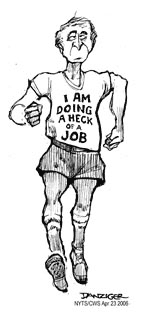 And Reed’s deliberate mingling of the religious and the governmental would have made George W. Bush look like a wild-eyed atheist.
And Reed’s deliberate mingling of the religious and the governmental would have made George W. Bush look like a wild-eyed atheist. When my novel The X President went out in manuscript form, a very well-known editor at a high-buck press rejected it with a note explaining that Bill Clinton is “on his way to becoming the most loathed US President in history.” Another loved the book, but said he could never get it past the remaining editors at his house, who were all virulently anti-Clinton. [Photo credit: Cathy Resmer, 802 Online]
When my novel The X President went out in manuscript form, a very well-known editor at a high-buck press rejected it with a note explaining that Bill Clinton is “on his way to becoming the most loathed US President in history.” Another loved the book, but said he could never get it past the remaining editors at his house, who were all virulently anti-Clinton. [Photo credit: Cathy Resmer, 802 Online] It clarifies things for even the most left-leaning reporters: they can take notes dutifully during the first term – half-consciously enjoying the blunt style of a Nixon or a Bush – and then expose the bastard for who he really is during the second.
It clarifies things for even the most left-leaning reporters: they can take notes dutifully during the first term – half-consciously enjoying the blunt style of a Nixon or a Bush – and then expose the bastard for who he really is during the second.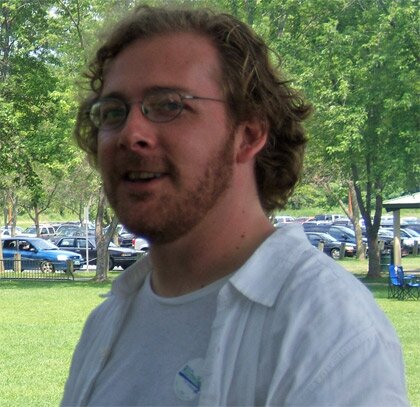
 Apparently VDB’s gentle humor occasionally goes awry, like a TOW missile that narrowly misses its military target, only to take out a Toys R’ Us store in the adjacent commercial block.
Apparently VDB’s gentle humor occasionally goes awry, like a TOW missile that narrowly misses its military target, only to take out a Toys R’ Us store in the adjacent commercial block.



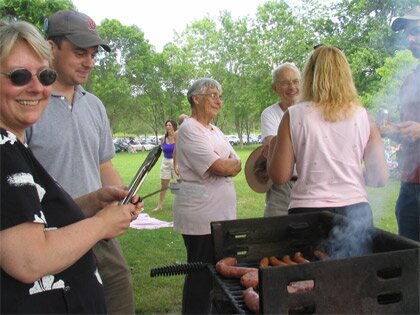
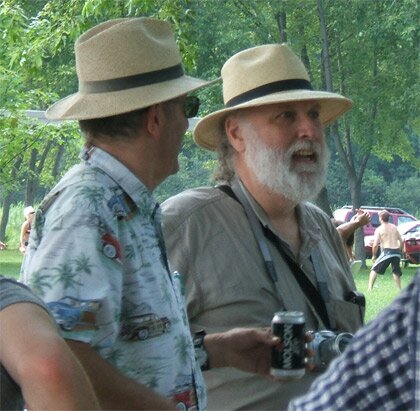
 Nearly all of the major campaigns turned out in force, with Parker and Welch and Dunne staffers blanketing the grass.
Nearly all of the major campaigns turned out in force, with Parker and Welch and Dunne staffers blanketing the grass.
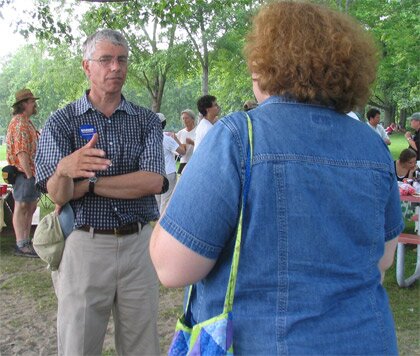
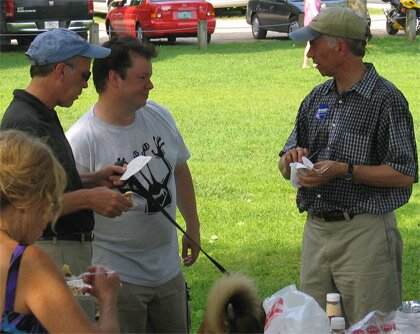
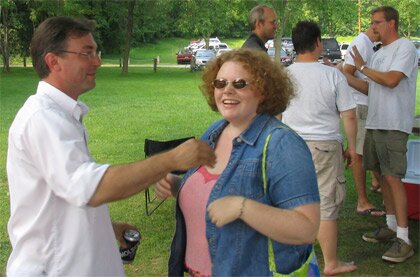

 Brattlerouser turns out to be this very soft-spoken person in a Hawaiian shirt who just landed a job at one of my favorite liberal clearinghouses, Raw Story.
Brattlerouser turns out to be this very soft-spoken person in a Hawaiian shirt who just landed a job at one of my favorite liberal clearinghouses, Raw Story. Recently, Steve wrote
Recently, Steve wrote 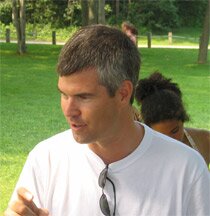 And I had a chance to introduce the rest of the blogosphere to some political friends from Burlington, like Representative and mayor-in-waiting Mark Larson, stand-up comic and State Rep. Jason Lorber, and my own city councilor, Russ Ellis.
And I had a chance to introduce the rest of the blogosphere to some political friends from Burlington, like Representative and mayor-in-waiting Mark Larson, stand-up comic and State Rep. Jason Lorber, and my own city councilor, Russ Ellis. Best of all, my neighbor Marc Nadel — VDB’s house cartoonist and caricaturist extraordinaire — made the scene with his wife Nancy, and it was nice to be able to point him out to readers who dutifully wade through the words at this site to get to the latest Nadel images.
Best of all, my neighbor Marc Nadel — VDB’s house cartoonist and caricaturist extraordinaire — made the scene with his wife Nancy, and it was nice to be able to point him out to readers who dutifully wade through the words at this site to get to the latest Nadel images.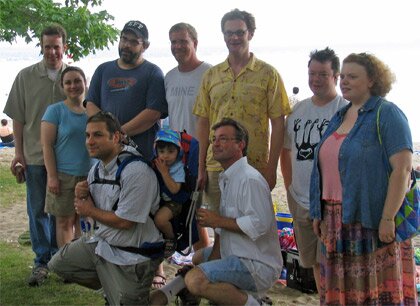
 Now if I could, I’d like to conclude by asking that everyone pause for a moment in deep contemplation, to thank the various animals that supplied by-products to produce the processed meats we grilled with such abandon.
Now if I could, I’d like to conclude by asking that everyone pause for a moment in deep contemplation, to thank the various animals that supplied by-products to produce the processed meats we grilled with such abandon.

 he’s earnest, and good-natured, and talks compellingly about his work in law enforcement. Currently he’s locked in an epic primary battle for the Democratic nod, with two well-respected and well-financed opponents.
he’s earnest, and good-natured, and talks compellingly about his work in law enforcement. Currently he’s locked in an epic primary battle for the Democratic nod, with two well-respected and well-financed opponents. And these two narratives — one about a serious prosecutor running a serious race for a real-world office, the other about a paunchy guy with badly-dyed hair boosting Heather Locklear over chain-link fences — kept mixing in my mind.
And these two narratives — one about a serious prosecutor running a serious race for a real-world office, the other about a paunchy guy with badly-dyed hair boosting Heather Locklear over chain-link fences — kept mixing in my mind.